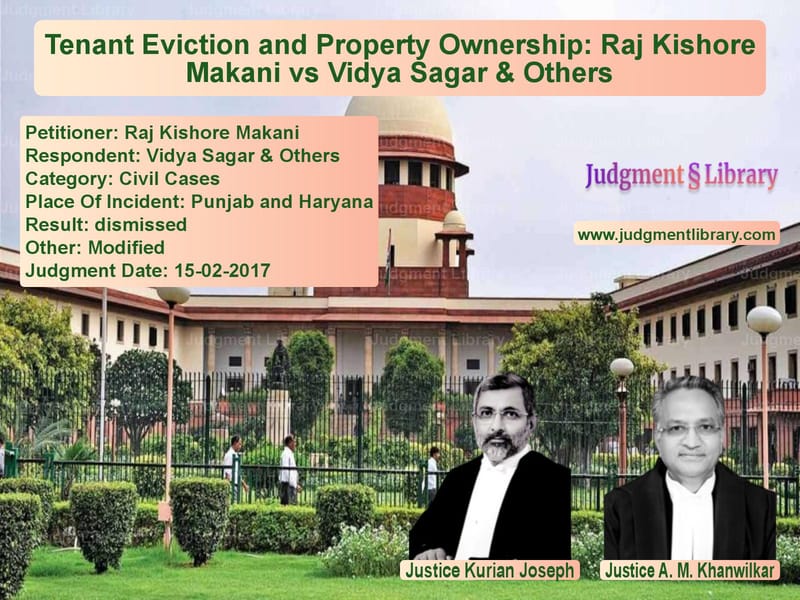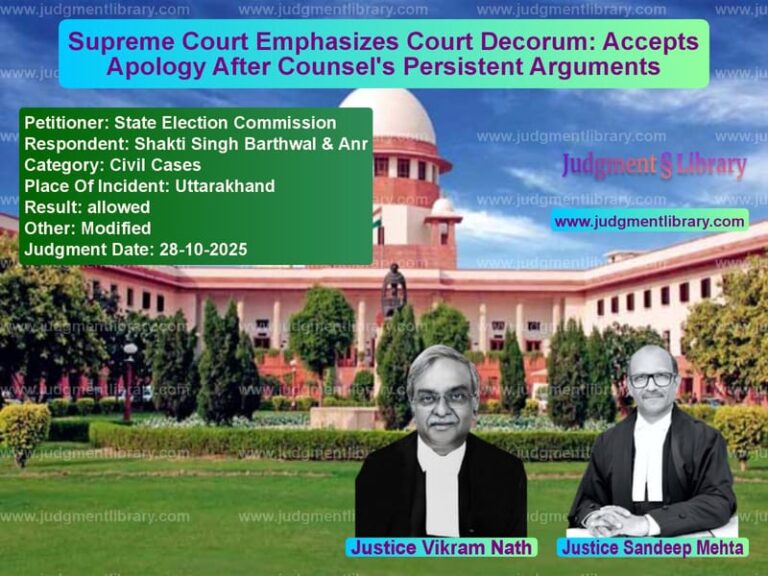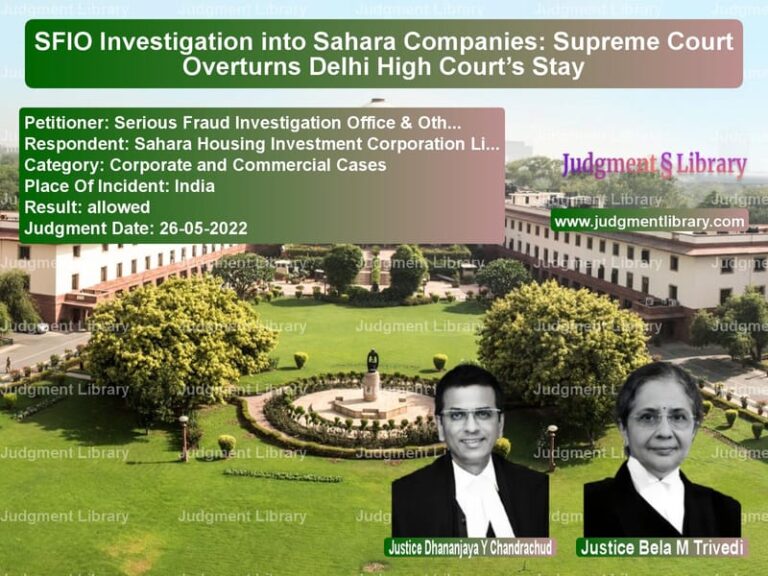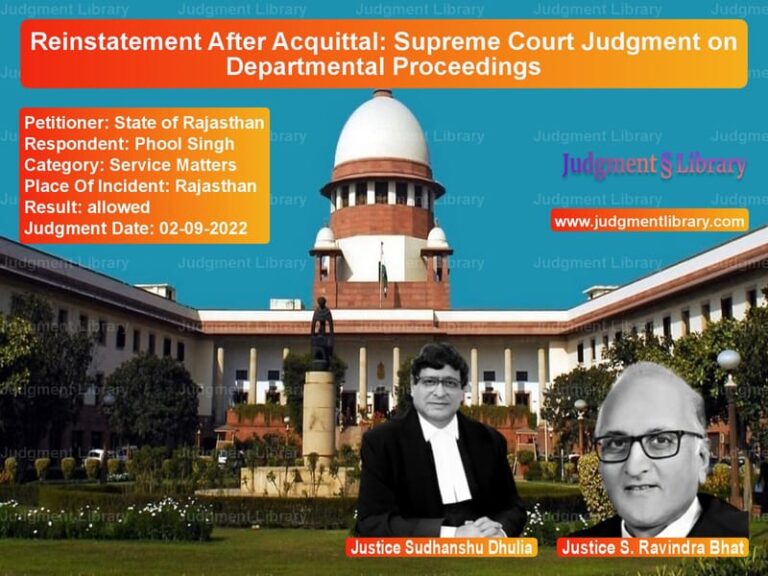Tenant Eviction and Property Ownership: Raj Kishore Makani vs Vidya Sagar & Others
The case of Raj Kishore Makani vs Vidya Sagar & Others revolves around a long-standing dispute between a tenant and landlords regarding eviction and property ownership. The primary question before the Supreme Court was whether the eviction of the tenant was justified under the law and whether the landlords’ requirement for the premises was legitimate.
Background of the Case
The appellant, Raj Kishore Makani, was a tenant occupying a property owned by the respondents, including Vidya Sagar (now deceased and represented by legal heirs). The landlords sought eviction on the grounds of bona fide requirement, a claim that was upheld by both the Rent Controller and the Appellate Authority. The High Court of Punjab and Haryana, in Civil Revision No. 490 of 2004, also ruled in favor of the landlords, affirming the eviction order.
Aggrieved by the decision, the tenant, Raj Kishore Makani, approached the Supreme Court, challenging the High Court’s order and arguing that there were errors in the findings of the lower courts.
Key Legal Issues
- Whether the eviction order passed by the Rent Controller and upheld by the Appellate Authority and High Court was legally valid.
- Whether the landlords had a bona fide requirement for the premises.
- Whether there was any legal basis for the tenant’s challenge to the ownership of the property.
Arguments by the Petitioner (Raj Kishore Makani – Tenant)
- The tenant argued that the findings of the Rent Controller, Appellate Authority, and the High Court were perverse and did not consider all facts.
- He contended that the landlords’ claim of bona fide requirement was not genuine and was merely a pretext for eviction.
- The tenant also questioned the title of the landlords over the property, arguing that they had no legal basis to seek his eviction.
Arguments by the Respondents (Vidya Sagar & Others – Landlords)
- The landlords argued that they had become the legal owners of the property and had the right to seek eviction.
- They asserted that the premises were required for their bona fide use and that the tenant had no legal grounds to challenge their ownership.
- They emphasized that the findings of all three courts—Rent Controller, Appellate Authority, and High Court—had consistently ruled in their favor.
Supreme Court’s Observations
The Supreme Court carefully reviewed the case and found no merit in the tenant’s claims. The Court upheld the concurrent findings of the lower courts and ruled that the landlords’ requirement for the premises was indeed bona fide.
The Court stated:
“Though the learned counsel made a persuasive attempt to say that there is perversity in the findings recorded by the Rent Controller, the Appellate Authority, and the High Court, having gone through the materials available on record, we see no reason to take a different view, which is concurrently taken by all the three Forums.”
The Court further emphasized that the landlords had a valid legal title over the property:
“There is also no basis for the challenge to their title. The clear finding is that the respondents had become owners of the premises.”
Final Judgment by the Supreme Court
The Supreme Court ruled:
- The appeal was dismissed.
- The tenant was given time up to December 31, 2017 to vacate the premises and hand over peaceful possession to Respondent No. 1.
- The tenant was required to file an undertaking in the Court within two weeks confirming compliance with the eviction order.
- The tenant was directed to pay Rs. 500 per month towards use and occupation charges from March 2017 until possession was handed over.
The Supreme Court concluded:
“The appeal is, accordingly, dismissed.”
Analysis of the Judgment
The ruling underscores several important legal principles in landlord-tenant disputes:
- Finality of Concurrent Findings: The Supreme Court reaffirmed that when three different courts arrive at the same conclusion, there must be compelling reasons to overturn their decision.
- Bona Fide Requirement: The Court upheld the principle that landlords have the right to reclaim their property if they can establish a genuine need.
- Respecting Property Ownership: The judgment reinforced that tenants cannot challenge the ownership of landlords without valid legal grounds.
Conclusion
The ruling in Raj Kishore Makani vs Vidya Sagar & Others serves as a crucial precedent in landlord-tenant disputes, reaffirming the principle that eviction can be granted when the landlord establishes a bona fide requirement. The decision further emphasizes the importance of respecting property rights and adhering to legal obligations.
This case highlights that tenants cannot indefinitely challenge eviction orders without valid legal reasons, and that courts will uphold rightful ownership claims when substantiated by evidence.
Don’t miss out on the full details! Download the complete judgment in PDF format below and gain valuable insights instantly!
Download Judgment: Raj Kishore Makani vs Vidya Sagar & Others Supreme Court of India Judgment Dated 15-02-2017.pdf
Direct Downlaod Judgment: Direct downlaod this Judgment
See all petitions in Property Disputes
See all petitions in Landlord-Tenant Disputes
See all petitions in Specific Performance
See all petitions in Judgment by Kurian Joseph
See all petitions in Judgment by A M Khanwilkar
See all petitions in dismissed
See all petitions in Modified
See all petitions in supreme court of India judgments February 2017
See all petitions in 2017 judgments
See all posts in Civil Cases Category
See all allowed petitions in Civil Cases Category
See all Dismissed petitions in Civil Cases Category
See all partially allowed petitions in Civil Cases Category







